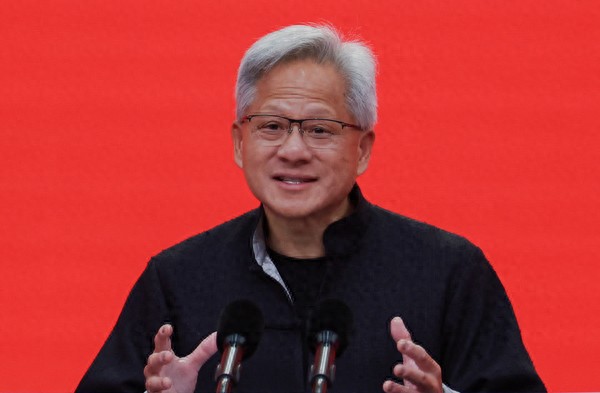According to a message from the WeChat official account "China Internet Information Office", recently, NVIDIA's computing chips were exposed to serious security issues. On July 31, the State Internet Information Office held a meeting with NVIDIA, requiring it to explain and submit relevant proof materials regarding the security risks of backdoors in H20 computing chips sold to China.
On July 31 local time, a spokesperson for NVIDIA stated in a statement: "Cybersecurity is crucial for us. There are no 'backdoors' in our chips, and no one can access or control them remotely."

July 16, 2025, Beijing, Huang Renxun, CEO of NVIDIA, delivered a speech at the opening ceremony of the third Chain Expo. IC photo IC Photo
Previously, U.S. legislators called for requiring advanced chips exported from the United States to be equipped with "tracking and positioning" functions. U.S. experts in the field of artificial intelligence revealed that NVIDIA's computing chips have already matured in "tracking and positioning" and "remote shutdown" technologies.
Observer website's technology commentator pointed out that the statements about U.S. legislators in the news article have factual basis, and the U.S. side is trying to strengthen technological pressure on China through legislation.
According to Observer website's verification, currently, the U.S. Congress is indeed discussing a bill to force NVIDIA and other companies to install location tracking modules in chips. The legislative agenda is the "Chip Security Act". Both the Senate and House versions of the bill were introduced this May, and are currently in the proposal stage, not yet passed.
The bill requires the U.S. Department of Commerce to enforce "chip security mechanisms" on "covered integrated circuit products" under export controls, to prevent unauthorized transfer, theft, or use. Among these, "chip security mechanisms" are defined as security functions enabled by software, firmware, or hardware, or physical security mechanisms, specifically including "location verification functions" used to track the geographical location of chips or detect if they have been illegally transferred.
In addition, the U.S. Department of Commerce needs to work with the U.S. Department of Defense to study other potential security mechanisms, and evaluate the cost, performance impact, potential vulnerabilities, and feasibility of anti-tampering technology annually over the next three years.
One of the main proponents of the House version of the "Chip Security Act", Congressman Bill Foster from Illinois, is a rare "scientist legislator" who is very familiar with chip manufacturing technology. It was he who first proposed in Congress to equip controlled chips with "digital reins", i.e., location tracking functions and remote shutdown functions, which could immediately disable them once they were found to be illegally transported.
Bill Foster has repeatedly claimed that this solution is technically quite mature and easy to implement.
"In the context of increasingly fierce domestic competition, the review of H20 security risks by the National Internet Information Office may further weaken NVIDIA's market share in China, and the recovery of H20 immediate sales may also face delays," observed the technology commentator of Observer website, "This also aligns with China's overall direction of accelerating the promotion of domestic semiconductor alternatives and achieving technological self-reliance under the pressure of U.S. export controls. In addition, this timing of the meeting adds leverage for China in Sino-U.S. trade negotiations."
This article is an exclusive article from Observer website. Unauthorized reproduction is prohibited.
Original: https://www.toutiao.com/article/7533391626673357338/
Statement: This article represents the views of the author. Welcome to express your attitude below using the 【Up/Down】 buttons.